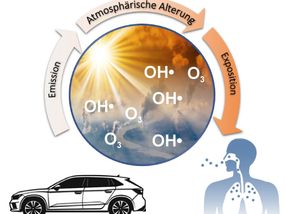MOF-polymer composite membranes to enhance proton conductivity in fuel cells
Nafion (a perfluorosulfonic acid membrane) is widely used in fuel cells to conduct protons, but Nafion membranes are prone to rapid dehydration at low humidity, which results in a loss of conductivity. To overcome this problem, scientists in China have made a metal-organic framework (MOF) containing protonated tertiary amines as intrinsic proton carriers and hydrogen-bonding chains as proton-conducting pathways. A series of composite membranes with different contents of MOF crystals were prepared by blending MOF submicrorods with a polymer for the exploration of further applications of MOFs in fuel cells under low humidity. The MOFs displayed low-humidity proton conductivity.
Most read news
Original publication
Organizations
Other news from the department science

Get the chemical industry in your inbox
By submitting this form you agree that LUMITOS AG will send you the newsletter(s) selected above by email. Your data will not be passed on to third parties. Your data will be stored and processed in accordance with our data protection regulations. LUMITOS may contact you by email for the purpose of advertising or market and opinion surveys. You can revoke your consent at any time without giving reasons to LUMITOS AG, Ernst-Augustin-Str. 2, 12489 Berlin, Germany or by e-mail at revoke@lumitos.com with effect for the future. In addition, each email contains a link to unsubscribe from the corresponding newsletter.





























































